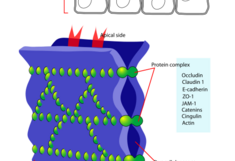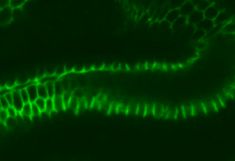Claudin-2 (CLDN2)
Claudin-2
A barrier comprising a single layer of cells surrounds many organs, including the brain, kidney tubules and the lining of the digestive tract.
It serves to regulate the transport of material, such as ions and proteins, between one side of the cell layer to the other. This regulation is crucial to the function and protection of the underlying tissue.
As such, the failure of these barriers is associated with pathological conditions such as meningitis and epilepsy.
In 1998, Furuse et al. identified claudins, a family of more than 20 membrane proteins in mammals, as the essential cell adhesion protein in the formation of these barriers.
Understanding how claudins work and how they fail could allow significant progress in the understanding of barrier-failure diseases.
Contact person: Dr. Darren Tan


